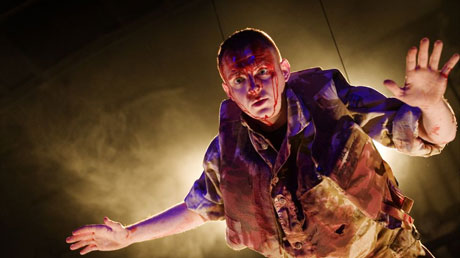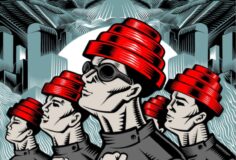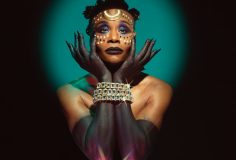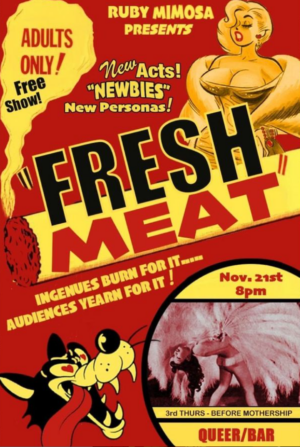
The National Theatre of Scotland’s Olivier Award winning play “Black Watch” on stage at The Paramount though May 5, 2013
Review: “Black Watch” by Gregory Burke. Produced by The National Theatre of Scotland. Directed by John Tiffany. Movement Direction by Steven Hoggett. Music Direction by Davey Anderson. With Stuart Martin, Robert Jack, Stephen Cole. Now through May 5, 2013 at The Paramount.
Yes, “War, war is stupid” and “Black Watch” the internationally acclaimed stage work from The National Theatre of Scotland takes great pains to portray the “War on Terror” as a rather stupid and pointless war. Told through the eyes of veterans of the 300+ year old, Scottish regiment of the British Army, The Black Watch and specifically veterans of the Iraqi War, the play portrays an actual incident in that war that left 3 soldiers dead and the effect of those deaths on the men who served with them, and the repercussions back home in Scotland, as well as the subsequent and controversial decision to unify the Black Watch with other regiments in the British Army. Based on actual interviews with the men, the play focuses on 8 soldiers, their sergeant and a commanding officer, but the story is largely told through the eyes of one man, Cammy and the repercussions of the war on himself and his fellow soldiers. It’s a small, tightly knit cast in a production that tells a story both universal (the horrors of war) yet very personal and intimate.
The nearly two hour play, without intermission, has won awards and praise for its gritty portrayal of war and the after effects on those who serve, as well as for its stylized staging that includes precisely choreographed movement pieces and the use of both live and recorded music. The gallery style staging by Olivier Award winning director John Tiffany (who went on to win the Tony Award for his staging of the musical, “Once”) makes unique demands on theaters hosting the production. Staged almost like a basketball or football game, the play requires a long rectangular playing era with two “end zones” at either end. Ticket holders for the Seattle production currently at The Paramount might be surprised to find themselves seated ON the stage at The Paramount in a very intimate environment. There really are no bad seats at this production; no one is more than 30 or 40 feet away from the actors. It’s a loud and up-close look at soldiers in the combat zone, as well as back home reflecting on what they won and lost while in that zone.
That’s also part of the problem with “Black Watch”. The play uses a flashback framework with the veterans telling their story to a writer and then those reminisces are reenacted. The “flashback” approach and more specifically, the “protagonist(s) telling their story to a writer/reporter” trope is older than the hills and not particularly engaging. It doesn’t help that the young, largely blue collar veterans are your typical “rough, tough, suspicious” men of the military and the writer is weak and ineffectual…it all reeks of cliche. And, to be honest, many of the “normal” scenes involving characters talking to each other and advancing the plot are a bit trite and unoriginal. We’ve seen many variations of this story before and it all boils down to “War Is Hell” and “Soldiers Are Comrades For Life” and “In War, Men Die For No Good Reason”. When it comes right down to it, we’ve seen the basic plot/premise of “Black Watch” on a hundred different episodes of “M*A*S*H”.
But, where “Black Watch” really shines, are in those stylized, choreographed scenes as previously mentioned. The scene where we are presented with three hundred years of Black Watch history is recreated in a brilliantly choreographed “fashion parade” with the main character Cammy narrating that history as he is lifted and dressed by the other members of the cast, in the various uniforms worn by the Black Watch during their history, is a glorious piece of staging and storytelling. It’s almost a cinematic effect; a montage of pageantry and pride that cleverly informs the audience of the back story of the Black Watch in a manner that is exciting and artistically challenging but doesn’t bog down the story.
That moment, and many more, which are credited to “BlackWatch’s” Movement Director, Steven Hoggett are the real reasons to see this play. Mr. Hoggett happily also won the Olivier for his work; for me, his choreography is solely what lifts this play into a thing of great beauty and emotional power. There are other powerfully staged, dance movement moments as well; the men receiving letters from home and another involving a brawl between them all. And, the heartbreaking ending as the men march, and fall, up and down the stage while under attack, was a beautifully constructed and crafted piece of theater. Regardless of your feelings on the military, it’s difficult to not feel emotional at the sufferings of the men and women who go to any war, justified or not.
The performances are strong, especially the charismatic Stuart Martin as Cammy, the lead character in the ensemble, and in a dual role as the Writer and the Sergeant, Robert Jack was very effective playing two very different characters. The entire ensemble was exceptional in a show that requires a lot both emotionally and physically from all the actors. It should be noted that the largely authentic Scottish accents from a cast that is native to Scotland (and, in the case of several of the actors, include family members who have served in the Black Watch) can be difficult to understand at times especially in the beginning of the play. You might want to watch “Trainspotting” before going to get your ears educated to the accent. (It should also be said, the actors are doing a modified, urban lower class Scottish accent…if they were being 100% authentic, no one outside of the UK would be able to understand them.)
The production is also aided by strong design work including a sound design that includes a lot of music, both recorded and performed live by the men, and some ear splitting war effects. It should be stated that this play may not be suitable for people who have issues with loud noise or light sensitivities; it IS a war play after all. And, it does contain very graphic language that to those overtly politically correct to the use of derogatory terms for gay men or women might wish to avoid…the word “cunt” as a term of non-endearment was used about 300 times during the course of the play. War also has a dirty mouth.
Also be advised that the length of the play, nearly two hours without intermission, and the intimate nature of the staging means that you shouldn’t drink a lot prior to the performance. If you leave during the show, you will not be re-admitted.
“Black Watch” is a schizophrenic show, with moments of amazing power and vitality as well as moments of banality and a sense of “we’ve seen this before”.
Just like real war.




















